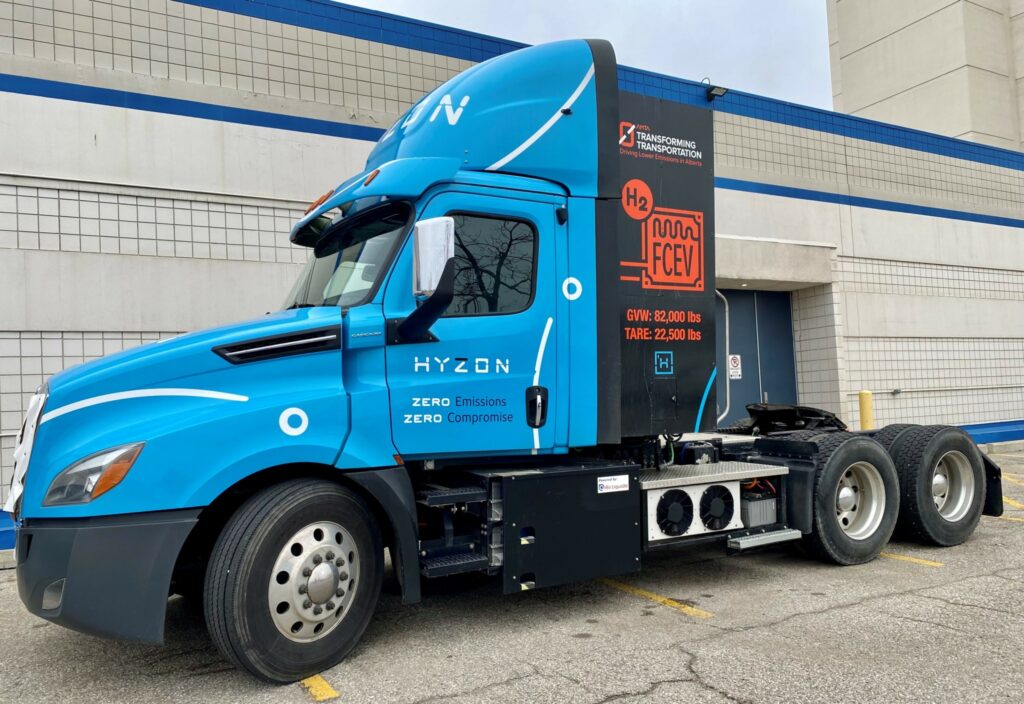Hydrogen-powered trucks in midst of tests, and proving their worth
It will be tough to replace diesel, but the time may be ripe to try a hydrogen fuel-cell-electric vehicle given promises that such trucks can slash emissions while also delivering required ranges and supporting today’s duty cycles.
Trevor Van Egmond, senior manager — industry advancement at Alberta Motor Transport Association (AMTA), was among speakers promoting the technology during the group’s annual meeting. And he openly urged members to sign up for short-term leases to test such equipment for a couple of weeks, to see how it can make sense.

“Compared to electric, hydrogen vehicles can be fueled much faster, in less than 10 minutes, and can drive up to 1,000 km,” Laura Guzman, vice-president partnerships, Hydra Energy, said during a discussion at the event.
David Van Den Assem, director of the Hydrogen Centre of Excellence at Alberta Innovates, predicted fueling stations and more hydrogen vehicles will be on the road in just a year or two.
Opportunities for testing
But Guzman stressed there was a need to communicate the technology’s commercial readiness, supporting trials and providing more opportunities for testing.
Carriers thinking of converting to hydrogen fuel need to consider their proximity to a refueling station, as well as the timelines needed to convert equipment, she added. Hydra Energy, which handles such work in the aftermarket, aims to convert a diesel-powered vehicle to hydrogen in two days.
Then there’s the issue of producing the fuel itself.
The most cost-effective way to deliver hydrogen will be via largescale production, distribution and dispensing, said Jeff Grant, HTEC vice-president — transportation solutions. Alberta’s oil and gas sector is already transitioning to blue hydrogen, using natural gas to produce the fuel and sequestering carbon dioxide, he added.
“Like liquified natural gas, hydrogen needs to be liquefied to be moved economically.”

Commercial carriers must also be satisfied that the fuel is safe, and that vehicle performance can be maintained or increased, Guzman noted.
Hydra, for example, converts existing vehicles so they can run on a mixture of 40% hydrogen and 60% diesel. The system switches automatically back to diesel when it runs out of hydrogen, and can work on any make or model of truck. The equipment is even reversible and can be transferred to another vehicle when leases expire.
Grants and incentives
AMTA’s Van Egmond admitted the $400,000 to $500,000 cost of a hydrogen fuel cell vehicle is prohibitive for smaller carriers, but grants and incentives are available. A 50% government price incentive can be utilized for dual-fuel trucks, he added.
Van Den Assem added there are federal government incentive programs along with technology development grants, too.
But Guzman would like to see federal and provincial governments offer lower-emission vehicles the same support and funding as zero-emission designs. Each type of equipment carriers a price premium compared to diesel-burning counterparts.
Harsh winters
There are other operational challenges to address in the meantime.
Van Egmond cited higher insurance costs and limits to weights and dimensions as examples. He said AMTA is advocating for concessions to support the heavier weights associated with batteries.
Then there are questions about how cold temperatures will affect performance. The association is looking to answer those by testing two hydrogen fuel cell trucks on a closed-circuit track, as well as running them in the winter between Edmonton and Calgary. The goal is to ensure they can travel 700 km on a full tank of hydrogen.
The clock is ticking as well.
Grant warned that, as demand for infrastructure ramps up, Alberta will compete with other Canadian provinces and U.S. states for equipment — and lead times are long.
Have your say
This is a moderated forum. Comments will no longer be published unless they are accompanied by a first and last name and a verifiable email address. (Today's Trucking will not publish or share the email address.) Profane language and content deemed to be libelous, racist, or threatening in nature will not be published under any circumstances.
Very informative and insightful. Well done Leo.